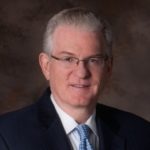Oklahoma’s top Southern Baptist official is disputing a recent newspaper headline implying that many Baptist clergy oppose a proposal to repeal a prohibition in the state constitution against using taxpayer funds for religious purposes.
Anthony Jordan, executive director of the Baptist General Convention of Oklahoma, complained in a Baptist Messenger column Oct. 12 that a Sept. 19 story in The Oklahoman headlined “Some Oklahoma clergy fear State Question 790 is going down ‘dangerous road’” was one-sided and misleading.
SQ 790, authored in the Oklahoma House of Representatives by Rep. John Paul Jordan (R-Yukon), a member of Trinity Baptist Church in Yukon, Okla., asks voters to repeal Section 5 of Article 2 of the Oklahoma constitution and allow public money to be spent for religious purposes.
It comes in response to an Oklahoma Supreme Court ruling that placing a Ten Commandments monument on the state Capitol grounds violated the Oklahoma constitution’s ban on the use of taxpayer funds for the benefit or support “of any sect, church, denomination, or system of religion.”
“As I read the article, I discovered that it quoted one liberal Baptist pastor whose Oklahoma church is actually a part of the moderate Baptist convention in Texas,” Jordan said. “The article then quoted the liberal Baptist Joint Committee. That was all. The author did not ask another Baptist, nor Catholic, nor Methodist for a statement on the subject. He only quoted one pastor, and yet implied many clergy opposed SQ 790. This article is poor journalism.”
Jordan said he is careful not to speak for the 1,800-church state affiliate of the Southern Baptist Convention on political issues unless state convention leaders have adopted a particular position, but he for one believes the no-aid provision ought to be repealed.
“We do need another tool in the arsenal of the ACLU and other liberal groups that, more times than not, seek to eliminate religious freedoms and religion from the public square,” Jordan wrote.
Jordan referred to Oklahoma’s no-aid to religious clause as the “Blaine Amendment,” a term used by groups such as the Becket Fund for Religious Liberty to describe state laws passed in the late 19th century they believe were motivated by animus against Catholic immigrants.
Others, like Brent Walker of the Baptist Joint Committee for Religious Liberty and Oklahoma Baptist pastor Mitch Randall, say such laws are needed because government funding of churches and religious organizations inevitably comes with government regulation.
Jordan said Oklahoma’s added layer of protection to the Establishment Clause of the U.S. Constitution “has been morphed into a whole new level of restriction on religious freedom,” illustrated by the state Supreme Court’s citation of the provision in an order keeping the Ten Commandments monument from being placed on the Capitol grounds.
“The Ten Commandments, which are the fundamental basis for the legal system of our country, when placed on state property, are deemed extremely egregious in regard to freedom from religion,” Jordan said. “Unfortunately, the law has been grossly misapplied. The issue of separation of church and state was never intended to protect the government, but to protect the church.”
Previous story:
BJC’s Walker says Okla. ballot question poses danger to religious institutions

